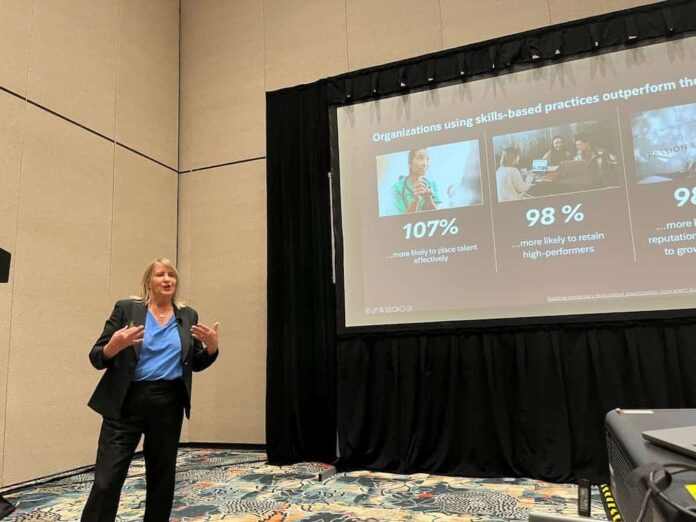The world of work is more than four years past the start of the pandemic, and the repercussions are still unfolding—from fallout from the Great Resignation to the rise of quiet quitting and ongoing debates over return-to-office.
All of these factors are driving up the risk for the relationship between employees and employers to become more transactional, heightening the need for HR to focus on strengthening the employee experience, said Yvette Cameron, senior vice president for Oracle Cloud HCM Product Strategy and one of HR Executive’s 2024 HR Tech Influencers.
5 must-haves to unlock talent, business performance
In a mega session at the Women in HR Technology Summit at Tuesday’s HR Tech Conference in Las Vegas, Cameron explored how HR can “put individuals front and center.”
“There are opportunities for organizations to invest in their workforce, in their technology, in their processes to change the game and improve the potential of the workforce—to unlock the potential of the organization,” she said.
These include:
1. Harnessing the power of AI
The impact of AI on HR and the employee experience is well-documented: Most importantly, Cameron said, AI can heighten efficiency—for instance, helping create job descriptions in just minutes—as well as quality. With the advent of generative AI, HR will become increasingly reliant on the technology, Cameron said, noting that Accenture research found that 85% of executives surveyed believe that gen AI and broadening digital access will drive transformation in their organizations.
The conversation is now turning to agentic AI—as gen AI-powered agents add a layer of sophistication and natural language to the capabilities of chatbots.
Oracle is delivering more than 100 gen AI capabilities, Cameron said, urging the packed audience at the session to work closely with their tech vendors to understand how they can leverage AI, particularly gen AI, to improve efficiency and quality.
“This is probably the most impactful way to unlock the performance of your workforce,” she said.
2. Unleashing the power of skills
The impact of skills-based hiring and advancement is undeniable, Cameron said, citing Deloitte research that found that organizations that focus on skills are 107% more likely than others to place talent more efficiently, 98% more likely to retain high performers and 98% more likely to have a reputation as a great place to work.
For skills-based decision-making to be successful, however, she noted, a skills strategy needs to be embedded across the HR organization—but, far too often, the strategy is fragmented.

“When skills are managed in siloed, separate systems—even if they’re integrated back to your core HR—there’s still a tremendous amount of friction and duplication, and you’re not getting the insights and the ability to act on skills in the way the work actually gets done,” she said.
Organizations need a “common language” for their skills architecture. Oracle’s Dynamic Skills, for instance, creates a single system of record that Cameron said helps unify skills processes and data.
She emphasized that attendees must think about skills strategically—particularly understanding the skills their workers possess unrelated to their specific job titles.
“I guarantee that three years from now, over a third of those jobs are going to change and a good number are going to be gone or shifted, with a new focus and a new demand on skills,” she said.
3. Creating seamless employee experiences
One of the biggest complaints Cameron hears from employees, she said, is that HR often asks for information the function already has.
Fielding such requests can be particularly frustrating for employees already feeling overloaded.
“Employees are burned out, disengaged and struggling,” she said. “There are so many different ways technology can help.”
Cameron pointed to employee experience platform Oracle ME. Among its functionalities, the tool can craft highly personalized communications to employees based on data in the HCM system.
“We have to focus on making sure employees feel heard, seen and understood,” she said.
4. Empowering leaders and managers
Managers today are being asked to navigate a lot of newness, she said, from hybrid environments to generative AI—and many aren’t prepared.
According to Gartner, 75% of managers today feel overwhelmed by the growth in their responsibilities, and 73% of leaders don’t believe their managers are equipped to lead change.
“You need to pay attention to the signals” that could suggest managers are struggling, Cameron said—which could involve survey data and lagging performance and productivity. “Use technology to help you understand what’s happening in the workforce and connect managers and employees in a very transparent way that demonstrates empathy for each individual.”
In particular, turn to tech—through automation and nudges, for instance—to avoid overwhelming managers with too much information.
“We used to say knowledge is power. Do you know what the new power is? Clarity,” she said. “[Tech can] cut through the noise and help people focus on what matters most.”
5. Accelerate the journey from data to insights to actions
HR and business leaders have access to plenty of data today—but too often, they can’t act on it effectively.
“When we don’t have comprehensive insights into data—and what data is telling us across our workforce and across our business—it’s the same as if we’re being asked to fly a plane without a cockpit,” she said.
Managers, in particular, need access to more than just pre-packaged reports. They need actual storytelling that draws insights from the data and offers recommendations for taking actions on those insights—which is possible by leveraging tech, she said.
“We need to understand where we are, what are our metrics and our measures, what are the important signals we need to pay attention to and the trends so we can course-correct,” Cameron said. “Without the right data and insights, that becomes very difficult.”



